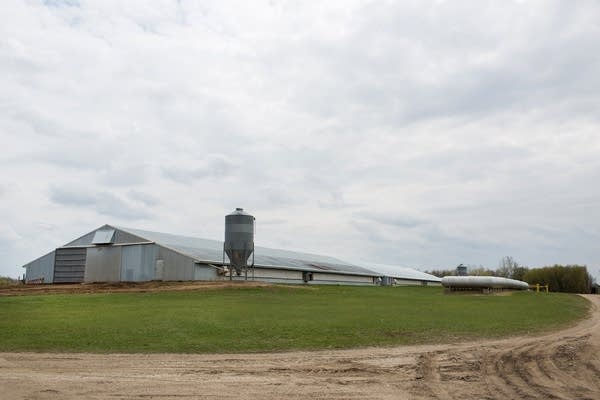For Minnesota turkey farmers, bird flu is the crisis of a lifetime

Go Deeper.
Create an account or log in to save stories.
Like this?
Thanks for liking this story! We have added it to a list of your favorite stories.
Greg Langmo hoped the years he'd spent keeping his turkey flocks healthy might spare his farm from the avian flu.
Then his manager called him one day in mid-April and said, "They just don't look right."
When he got to the infected barn, Langmo saw right away that the 11,000 turkeys were sick. Only a few had died, but the rest were acting like they might be next to go.
"In the morning, there's always a lot of chattering, running and flying and jumping. There was none of that," said Langmo. "Just complete silence."
Turn Up Your Support
MPR News helps you turn down the noise and build shared understanding. Turn up your support for this public resource and keep trusted journalism accessible to all.

Tests confirmed the flock had the H5N2 virus. Within four days the disease had killed nearly all his birds. Turkeys in two other barns on this site were killed as a preventive measure.
For poultry producers like Langmo, avian flu is the worst disease outbreak they've ever seen. Avian influenza has decimated turkey and chicken flocks, with nearly 4 million birds lost to the disease. Since the outbreak began in March, the virus has inflicted a financial and emotional toll on farmers. Some wonder if they can survive.
In two months, the disease has hit farms from the Iowa border to near Canada. The H5N2 virus has cost farmers millions of dollars in losses.
Langmo lives in hard-hit west central Minnesota, where dozens of flocks have been struck down. Farmers are keeping almost constant watch over their birds, supporting each other and wondering which farm will be next.
"I'm texting some guys at 3:30 and 4 in the morning, and they're in the barns or in the offices," said Langmo. "Nobody's sleeping. You go to sleep out of sheer exhaustion. And the moment you wake up your mind starts and you're done."

Standing near the infected barn, Langmo, a lifelong turkey producer, can only shake his head in amazement at the damage the disease has caused in Meeker County and across Minnesota.
"This is just completely mind-blowing," he said.
The financial fallout is just as harsh. Langmo says he hasn't calculated his loss, but says it likely will be at least $100,000, and probably a lot more. He says he's not sure if this decades old turkey farm will be able to keep going.
"We're sitting here watching the equity that we've built in this business over the last 50 years, 60 years, get flushed down the toilet," said Langmo. "Pretty tough to survive."
It will be months before he can put turkeys back in the affected barns. That lost production will reduce the year's expected revenue even more.
State and federal regulators must re-certify the barns for production before turkeys can be restocked in the buildings. Langmo says there should be more federal or state help available than what's being offered now to help producers through the financial turmoil of the bird flu.
"I've told each of my staff independently that we're going to spend everything we have in our checkbook and then we're done," said Langmo. "But we're not going to quit until we're broke."



